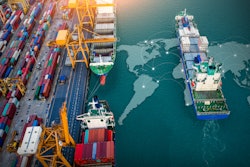LONDON (AP) -- BP PLC says the cost of the devastating Gulf of Mexico oil spill has grown to $40 billion, dragging down its third quarter net profit by more than 60 percent despite higher oil and gas prices.
The London-based company said Tuesday it returned to profit for the first time since the April spill, though the $1.79 billion net income was still well below a year-earlier profit of $5.3 billion because it set aside an extra $7.7 billion to pay for the spill response and cover future fines and compensation.
The latest spill charge, due to a delay in sealing the busted Macondo well, was far above market forecasts of a rise of around $2-3 billion. Still, analysts said underlying earnings, which exclude some one-off charges, were 20 percent better than expected in the third quarter.
The company's exploratory Macondo well in the Gulf blew out on April 20, killing 11 workers and kicking off the worst oil spill in U.S. history. Oil kept gushing until July 15, but it took BP another two months -- until Sept. 19 -- to completely seal the well.
Richard Hunter, head of UK Equities at Hargreaves Lansdown Stockbrokers, said the update is a "stark reminder that the fallout from the spill will follow BP for some considerable time to come."
"It remains to be seen whether the renewed provision of $40 billion will finally kill the issue or whether, as is also possible, it will be an overestimation."
BP faces a fine of up to $1,100 under the Clean Water Act for each barrel of oil spilled and may still be barred from gaining new licenses to operate in the Gulf, which accounts for around 10 percent of its production. The company said it calculated its potential liability for using a range of flow estimates, and assumed that the company would not be found grossly negligent.
BP's own investigation admitted a share of the blame, but also laid responsibility on Transocean, which owned the drilling rig, and contractor Halliburton. It has also billed minority partners Anadarko Petroleum Co. and MOEX Offshore nearly $4.3 billion for their share of the accident.
Chief Executive Bob Dudley, who is presiding over his first quarterly earnings since replacing Tony Hayward a month ago, said the company is "well on track" for recovery with sales agreements in place for around $14 billion of assets -- half the amount it has targeted to build up a war chest.
"We have made good progress during the quarter," Dudley said in a statement. "This strong operating performance shows the determination of everyone at BP to move the company forward and rebuild confidence after the terrible events of the past six months."
All the other major oil companies, except Chevron, have reported stronger third quarter profits improved thanks to higher oil and gas prices.
They said it's time to get back to work in the Gulf of Mexico, even with the U.S government promising to rule the waters with a heavier hand since lifting a temporary ban on drilling.
Wells in the Gulf can be very profitable and taxes and royalties in U.S. waters are considered to be much lower than elsewhere in the world. Drilling projects there typically break even when oil sells for $50 to $60 per barrel. It's currently trading near $82 per barrel.
Chevron and Shell have both submitted requests for projects since President Barack Obama lifted the drilling moratorium on Oct. 12, but new regulations, which include more rig inspections, are expected to make it harder for companies to obtain offshore drilling permits.
BP's ability to expand its operations remains in doubt.
Dudley has been working to rebuild BP's shattered reputation, particularly in the United States, and turn around a 35 percent rout in the company's share price since the Gulf explosion.
The stock was 1.7 percent higher 431 pence ($6.91) in morning trading on the London Stock Exchange.
Evolution Securities analyst Richard Griffith said he was maintaining a "buy" recommendation for the company, with a target price of 510 pence, "as we believe the true liability for the Macondo accident to be nearer $25-30 billion as opposed to the around $60 billion the market is discounting."
Replacement cost profit -- a key industry benchmark -- was $1.85 billion in the third quarter, compared with a loss of $17 billion in the second quarter and a profit of $7.36 billion a year earlier.
For the third straight quarter, BP paid no dividend but promised to review the policy before announcing fourth-quarter results in February. The company scrapped the payment for the first three quarters of the year to free up cash for spill costs and to ease political and public pressure.
Analysts are looking for the next major strategic steps from the new boss, who has already unveiled a reorganization of BP's business, splitting the company into three divisions, and the establishment of an independent safety division. He recently told employees that their performance on safety issues will be the only measure for awarding fourth-quarter bonuses as the company tries to tighten performance and clean up its image.
Dudley has spent the weeks since becoming CEO on Oct. 1 touring BP's projects around the world, shoring up support from partners and investors. But he's also put a firm emphasis on safety, meeting with experts from other hazardous industries, including the nuclear and chemical industries.















